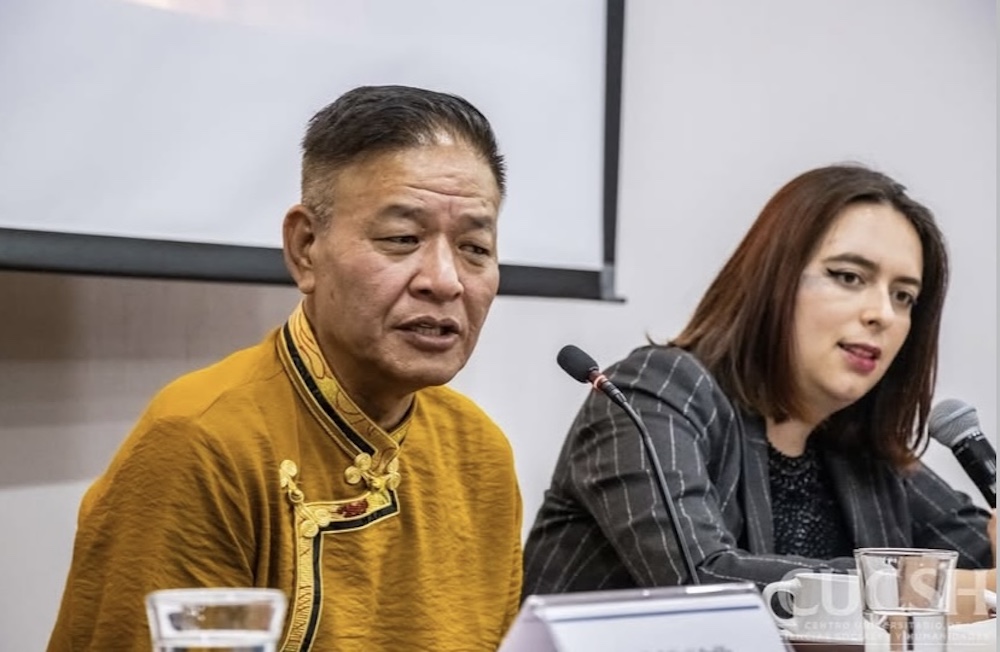The concert, dedicated to the 70th anniversary of HH Dalai Lama took place in Moscow Music Hall. In this concert participated not only the performers of the ethnic music of different buddhist nations, but also the universal guru of russian rock music Boris Grenenschikov.
The concert started, accordingly to the event, devoted to such an important for buddhists occasion, with the performance of the tibetan monks from Gyudmed monastery. Four lamas in traditional yellow-red robes showed a unique style of Tibetan throat chanting, which is practiced only in two monasteries – vibrating on low frequencies hollow roar, called Yamantaka voice" (Yamantaka is a buddhist god of death).
But they didn’t mean there in a Music Hall to put the public into a mystic trance. The monks were followed by the tibetan folk troupe Gandjong Doeghar, performing a funny Yak dance. A furry animal, represented by two hidden under the flay dancers, was either dancing in the manner of chinese new years dragon, or moving its ears very naturally, driving off the imaginary insects, so that tired to meditate spectators liked it a lot. The role of the leading star of the concert was given to Boris Grebenschikov, whom the president of the festival and the gallerist Elena Vrublevskaya, introduced as one of the main popularizes and even the investigator of buddhism, by this confusing not only the spectators, who never suspected BG to be the orientalist, but also the leader of Aquarium himself. Mister Grebenschikov confessed that frankly speaking he was shy to perform on such an important occasion as Dalai Lama’s birthday, but yak dance made him relaxed and he suggested considering his performing as its continuation – it appeared to be really funny, though not as funny as tibetan dancers did. More or less corresponding to the theme of the festival song in his repertoire was only :"Russian nirvana", after that he shifted to not understandable to common people midconfessional and crosscultural fields. The guru of russian rock finished his performing with reggie Zum zum zum"A real discovery of the concert was the performance of a tibetan living in Switzerland Loten Namling, it brought the public back to tibetan realities and to a good sound, which m-r Grebenschikov’s performance lacked. Longhaired, dressed in a scenic white clothes, the singer looked not only as an artist , but as a real shaman, meanwhile he was speaking a perfect English, telling the public, that this song was written by 6th Dalai Lama in a moment of enlightenment, and that song – by a saint hermit, living in Xth century in Tibet. But the confidence in a sacred origin of these songs doesn’t prevent Loten Namling from correlating them with a western music culture – now he’s working on a project Tibetan blues" Loten Namling seems to be a permanent participant of different international concerts, dedicated to Tibet, so that in Moscow he didn’t forget to say a sacramental phrase that he hopes one day to return to his motherland. (The Guydmed monks, and the members of the group Gandjong Doeghar and Dalai Lama himself are the refugees, living in India) A common interest to Tibet on the west is connected not only with enthusiasm about eastern mystics, but also with defending the independence of this country, which is now the part of China. Thus the concerts collecting many progressive rock stars, organized in different western cities by one of the members of the group Beastie Boys Adam Yauch , are under the slogan Tibetan freedom". And the main buddhist of Hollywood Richard Gere , who was the guest of the tibetan festival in Moscow in 2004, is not a preacher of lamaism, but a fighter for tibetan freedom. But on the concert in a Music Hall none of the political slogans were heard. The moscow public was invited to enjoy the treasures of the ancient culture, but not to think about the present situation of the people who created this culture.
The main idea of the concert was brotherhood of tibetans and their coreligionists from buddhist republics of Russia: Tuva, Buryatia and Kkalmykia. The throat chanting was performed not only by Gyudmed monks, but also by world music tuvin stars – Huun-Huur-Tu". Charming eastern tunes were performed by buryatian ethnostar Badma-Xanda – her improvised duet with Loten Namlin has become the most beautiful moment of the concert. Kalmykian group Yoral" demonstrated a very showy variety version of asian music culture. Anticipating their performance, Mme Vrublevskaya didn’t forget to thank the president of Kalmykia Kirsan Ilyumjinov, the head of the trustee council of the festival Tibet who actively propagandizes buddhism and even organized the visit of Dalai Lama to Kalmykia in November 2004. But the underlying theme of the festival appeared to be not the problems of Tibet itself, but some utopian local Shambala, where everything is at hand – whether it is throat chanting or guru like BG.









